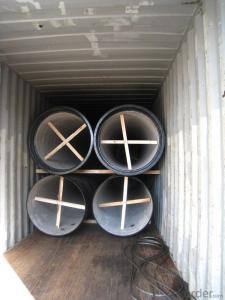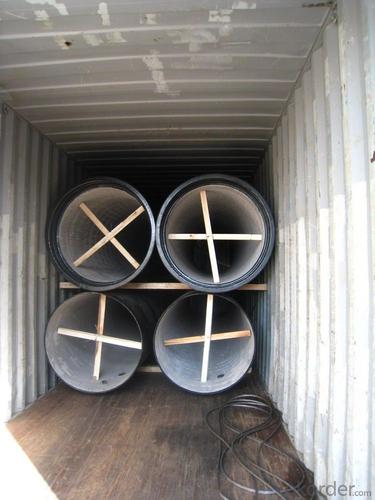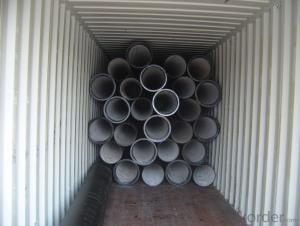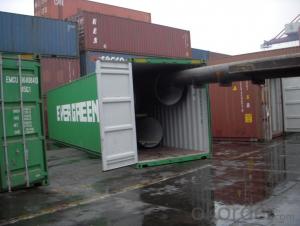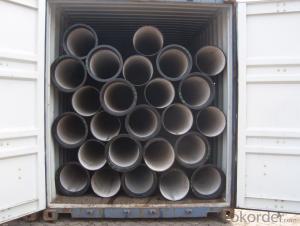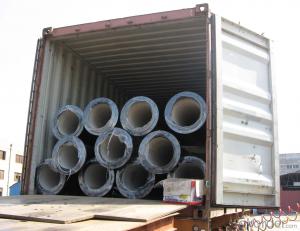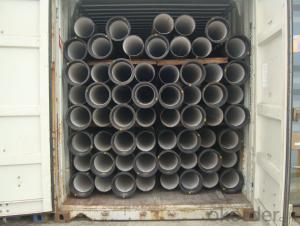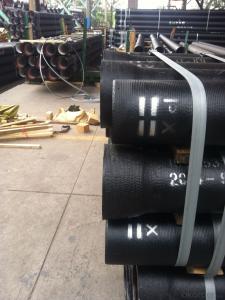DUCTILE IRON PIPES AND PIPE FITTINGS K8 CLASS DN1400
- Loading Port:
- Tianjin
- Payment Terms:
- TT OR LC
- Min Order Qty:
- 22 pc
- Supply Capability:
- 3000 pc/month
OKorder Service Pledge
OKorder Financial Service
You Might Also Like
Material : Ductile Cast Iron
Size Range : DN 80mm to DN 2000mm
Unit Effective Length : 6m or 5.7m
Manufacture Standard: ISO 2531:1998/ EN 545:2006/EN 598:2007
Annual capacity : 200,000 tons
Coating Exterior: Zinc 130g/m2 according to ISO 8179-1 and bitumen coating 70 microns.
Cement Interior: Portland Cement/ High Alumina Cement/ Sulphate Resisting Cement Lining according to ISO 4179
Special requirements on external coating and internal lining can be applied
We also provide accessories such as SBR/EPDM rubber gaskets, lubricant paste, pipe caps, PE sleeves, etc.
Additional Parts:
Each pipe is strictly inspected according to related standard to ensure permanently high performance.
Easy Installation at site and service free for life
Long Service Lifespan
Quotation will arrive you within 24hours once we get your inquiry.
We guarantee offering you a competitive price.
A copy of original inspection reports of pipes will be offered after shipment.
Photos of loading process will be sent to the customer after shipment effect.
We will follow-up the delivery progress after shipment effect and update to the customer on weekly basis.
- Q: Can ductile iron pipes be used for industrial applications?
- Yes, ductile iron pipes can be used for industrial applications. Ductile iron is a type of cast iron that has significantly improved mechanical properties, including increased ductility and strength, compared to traditional cast iron. These qualities make ductile iron pipes highly suitable for industrial applications where durability, strength, and resistance to external forces are crucial. Industrial applications often involve high-pressure water or fluid transportation, and ductile iron pipes are designed to withstand such conditions. They have excellent tensile strength, which means they can resist deformation and fractures, making them ideal for handling heavy loads and withstanding significant internal and external pressures. Additionally, ductile iron pipes have excellent corrosion resistance properties, making them highly suitable for industrial applications where exposure to harsh chemicals or corrosive substances is common. Their resistance to corrosion ensures a longer service life and reduces maintenance costs associated with pipe replacement or repairs. Furthermore, ductile iron pipes are known for their versatility and adaptability. They can be easily connected and integrated into existing infrastructure, making them a preferred choice for industrial applications. Their high strength-to-weight ratio allows for easy handling and installation, which is essential in industrial settings. In conclusion, ductile iron pipes are suitable for industrial applications due to their improved mechanical properties, corrosion resistance, and versatility. Their ability to withstand high pressures, resist deformation, and adapt to existing infrastructure make them an excellent choice for various industrial applications.
- Q: How do ductile iron pipes handle pressure surges in pumping stations?
- Ductile iron pipes are specifically designed to handle pressure surges in pumping stations effectively. The inherent strength and flexibility of ductile iron make it well-suited to withstand the sudden increase in pressure that can occur during pump start-up or shutdown. One of the key features of ductile iron pipes is their ability to absorb and dissipate energy. When a pressure surge occurs, the ductile iron pipes have the capacity to absorb the excess pressure and distribute it evenly throughout the pipe network. This helps to minimize the impact of the surge and prevent any potential damage to the pipes or the pumping station. Additionally, ductile iron pipes have a high resistance to impact and stress, which further enhances their ability to handle pressure surges. The pipes are manufactured using a unique process that imparts strength and durability, allowing them to withstand the forces exerted during pressure fluctuations without any significant deformation or failure. Furthermore, ductile iron pipes have a smooth internal surface, which reduces friction and turbulence within the pipe network. This smooth flow characteristic helps to mitigate the effects of pressure surges by allowing the water to move efficiently without creating additional stress on the pipes. In summary, ductile iron pipes are specifically engineered to handle pressure surges in pumping stations by absorbing and dissipating the excess pressure, withstanding the impact and stress, and promoting smooth flow. Their robustness and reliability make them an ideal choice for applications where pressure fluctuations are common, ensuring the longevity and efficiency of the pumping infrastructure.
- Q: Are ductile iron pipes suitable for horizontal directional drilling (HDD) installations?
- Yes, ductile iron pipes are suitable for horizontal directional drilling (HDD) installations. They possess the necessary strength and flexibility to withstand the drilling process and can be easily installed underground without compromising their structural integrity.
- Q: How are ductile iron pipes tested for quality?
- Ductile iron pipes are tested for quality through various methods, including hydrostatic pressure testing, dimensional inspection, and mechanical properties testing. Hydrostatic pressure testing involves subjecting the pipes to water pressure to ensure they can withstand the intended operating conditions without any leakage or failure. Dimensional inspection assesses the pipes' dimensions, such as diameter, wall thickness, and length, to ensure they meet the specified standards. Mechanical properties testing evaluates the pipes' tensile strength, yield strength, and elongation to ensure they possess the necessary strength and flexibility. Overall, these rigorous testing procedures help ensure the high quality and reliability of ductile iron pipes.
- Q: What is the purpose of ductile iron pipes?
- The purpose of ductile iron pipes is to provide a reliable and durable infrastructure for the transportation of fluids, such as water, sewage, and gas. Ductile iron pipes offer significant advantages over other materials such as steel or PVC pipes. One primary purpose is to ensure the safe and efficient supply of water to communities. Ductile iron pipes are designed to withstand high pressures and can handle the harsh conditions of underground environments, making them ideal for water distribution systems. They have a long service life and require minimal maintenance, reducing the need for frequent repairs or replacements. Another purpose is to effectively transport sewage and wastewater. Ductile iron pipes have excellent corrosion resistance, ensuring that they can withstand the corrosive nature of sewage and other waste materials. They are also structurally strong, capable of withstanding heavy loads and ground movements, making them suitable for underground sewer systems. Ductile iron pipes are also utilized for the transportation of gas. They have excellent mechanical properties and can withstand high-pressure applications, making them ideal for gas distribution networks. Additionally, their durability and resistance to external factors like soil movement or temperature changes make them a reliable choice for gas transmission systems. Overall, the purpose of ductile iron pipes is to provide a robust and long-lasting solution for the safe and efficient transportation of fluids, contributing to the development and maintenance of essential infrastructure systems that support our communities' needs.
- Q: Can ductile iron pipe be used for underground storage tank systems?
- Certainly, underground storage tank systems can utilize ductile iron pipe. Renowned for its robustness and potency, ductile iron pipe proves itself adaptable for diverse purposes, including underground storage tanks. Its exceptional tensile strength and immunity to corrosion render it a superb selection for confining and conveying liquids or gases in subterranean settings. Furthermore, ductile iron pipe exhibits remarkable resistance to external pressures and endures substantial burdens, establishing it as a dependable choice for underground storage tank systems.
- Q: What are the advantages of cast iron pipes?
- The cast iron pipe has good sealing performance and is not easy to leak. It can reduce the leakage rate of the pipe network and reduce the daily maintenance cost of the pipe network
- Q: Can ductile iron pipes be used for underground geothermal systems?
- Yes, ductile iron pipes can be used for underground geothermal systems. Ductile iron is known for its strength and durability, making it a suitable choice for underground applications. Additionally, it has good corrosion resistance, which is essential in geothermal environments where water and soil conditions can be aggressive.
- Q: DN1800 can the length of ductile iron pipes be several meters? What is the total weight?
- Ductile cast iron pipe after annealing, the microstructure is ferrite and pearlite, good mechanical properties, excellent corrosion resistance, good ductility, good sealing effect, simple installation, mainly for municipal, industrial and mining enterprises, water supply, gas, oil etc..
- Q: How can the ductile iron pipe be welded?
- If the hole on the ductile iron pipe, you can use special hoop lined flexible rubber ring, rubber ring and pipe wall coating with rubber ring, glue to be fixed.
Send your message to us
DUCTILE IRON PIPES AND PIPE FITTINGS K8 CLASS DN1400
- Loading Port:
- Tianjin
- Payment Terms:
- TT OR LC
- Min Order Qty:
- 22 pc
- Supply Capability:
- 3000 pc/month
OKorder Service Pledge
OKorder Financial Service
Similar products
Hot products
Hot Searches
Related keywords
